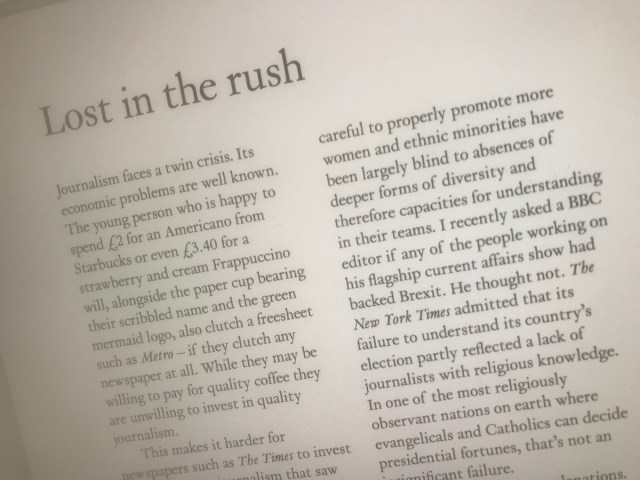From the British Journalism Review

This article first appeared in the British Journalism Review.
Journalism faces a twin crisis. Its economic problems are well known. The young person who is happy to spend £2 for a Caffe Americano from Starbucks or even £3.40 for a Strawberries and Cream Frapuccino Blended Crème will, alongside the paper cup bearing their scribbled name and the green Mermaid logo, also clutch a free-sheet like the Metro – if they clutch any newspaper at all. While they may be willing to pay for quality coffee they’re unwilling to invest in quality journalism.
This makes it harder for newspapers like The Times to invest in the campaigning journalism that saw Andrew Norfolk expose Rotherham’s child sex scandal. The economic weakness, accelerated by Facebook and Google’s hoovering up of advertising revenues, reinforces the other big weakness – a herd-like remoteness from how many people now struggle through their lives.
Headquartered in big cities like London, New York and Los Angeles the average newsroom has always reflected the values of metropolitan areas. Journalists are invariably better off, more secular, liberal and left-wing. But, as the last eighteen months have demonstrated, when few in the media anticipated – or even felt equipped to explain – the votes for Brexit, Trump and then (in huge numbers) for Corbyn, the gap between the reporters and the reported upon has become a yawning one.
Media outlets that are rightly so careful to properly promote more women and ethnic minorities have been largely blind to absences of deeper forms of diversity and therefore capacities for understanding in their teams. I recently asked a BBC editor if any of the people working on his flagship current affairs show had backed Brexit. He thought not. The New York Times admitted its failure to understand its country’s election partly reflected a lack of journalists with religious knowledge. In one of the most religiously observant nations on earth where evangelicals and Catholics can decide presidential fortunes that’s not an insignificant failure.
The gap has many explanations. There are fewer local and regional reporters. Media models that are working commercially are specialising. That includes high-end financial titles like the FT and Wall Street Journal or controversial, ideological platforms like Fox News – where anchors earn as much as CEOs. Neither connect or unite.
Talking to UnHerd.com, the new media platform I’m editing, the BBC’s Jonathan Dimbleby pointed to the contribution of technology. Journalists were traditionally isolated from their HQs and, without mobile phones, filed by primitive methods of communication. Today, with Twitter, every hack knows what other hacks have instantly concluded about a topic. Independent thinking isn’t impossible – but it’s harder. Dimbleby also points to a celebrity factor. He notes how top BBC talents are omnipresent:
“They have to keep talking. They’re wanted on television, on radio, online. How they have time to think for themselves – to have those background conversations with people who give them a unique insight – I do not know. I fear looking and listening, they don’t have enough time.”
It is regrettable that the BBC isn’t different enough from other players – its unique funding system should mean public service can trump ratings. It should be the ways in which a 24/7 rolling news culture encourages short-termism in western societies – where politicians are judged on latest polling ratings and businesses on quarterly returns. Because, rather than endlessly debated biases to left or right, the most damaging biases of ‘fast news’ are to the new over the important; to the negative over the positive; to the controversial over the consensual; to celebrity over the learned; and to politics over the cultural, technological and other upstream influences on our times (watch video).
I suspect that an unwillingness to examine the weaknesses of ‘fast news’ led outlets like CNN to encourage a shifting of blame to ‘fake news’. While there is much that is untrustworthy on the wild-world-web it was CNN and other supposed media grown-ups that gave Trump $5.6 billion of free coverage. They gave him that coverage because more people stopped channel hopping when his orange visage was on screen than when Hillary Clinton or any of his rivals for the Republican nomination were ‘live’.
We’ll make mistakes at UnHerd and having put our heads above the parapet I know those mistakes will be seized upon. But when even the BBC’s general election coverage was trusted by less than half of Britons, experiments in journalism may be risky but are vital. Our aim to master a few topics and by publishing diverse ideological perspectives we hope to gain audience trust. By doing less politics and more history we hope to provide more context. We’re looking forward to debating our approach and learning from an industry which still employs some of the most talented and public-spirited of truth-seekers. Hopefully, ventures like UnHerd, will encourage the industry to bring out the best in those talents.










Join the discussion
Join like minded readers that support our journalism by becoming a paid subscriber
To join the discussion in the comments, become a paid subscriber.
Join like minded readers that support our journalism, read unlimited articles and enjoy other subscriber-only benefits.
Subscribe